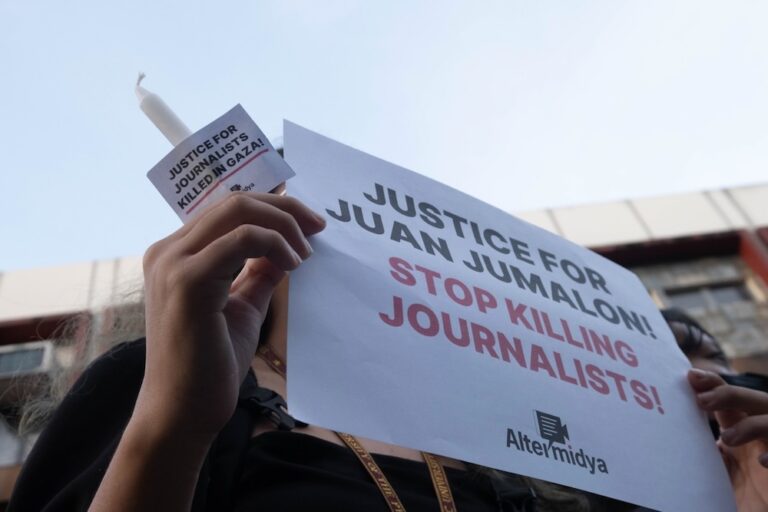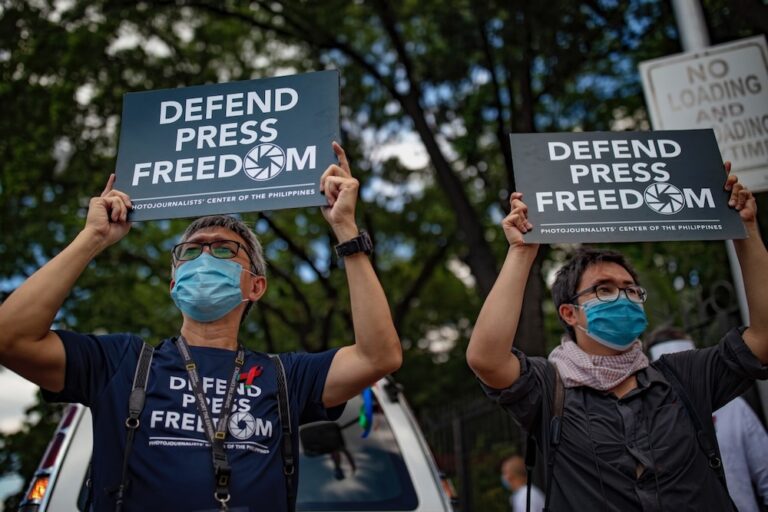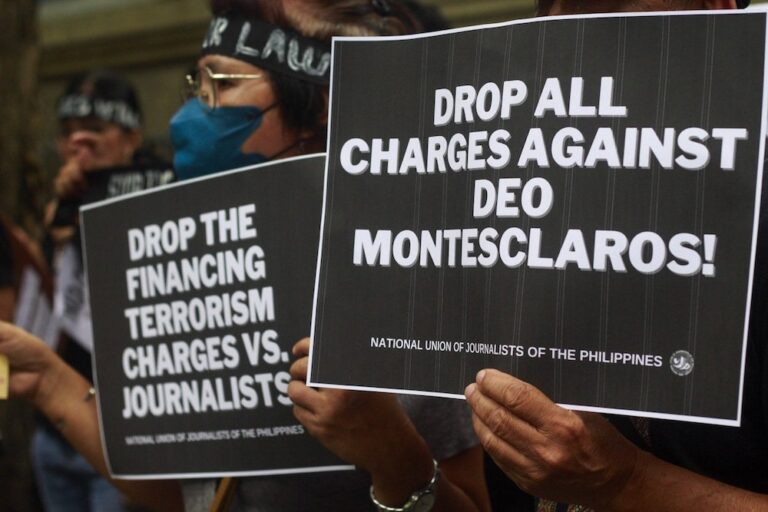(CMFR/IFEX) – Over a hundred journalists filed two separate suits on 28 January 2008 in a unified effort to halt government threats against the press as well as further arrests. Makati City Regional Trial Court (RTC) Executive Judge Winlove Dumayas granted a 72-hour temporary restraining order (TRO) barring the police, military, and other government offices […]
(CMFR/IFEX) – Over a hundred journalists filed two separate suits on 28 January 2008 in a unified effort to halt government threats against the press as well as further arrests.
Makati City Regional Trial Court (RTC) Executive Judge Winlove Dumayas granted a 72-hour temporary restraining order (TRO) barring the police, military, and other government offices from issuing “threats of arrests or from implementing such threats” against the media.
The TRO was issued just two hours after 36 journalists and four media organizations, including CMFR, filed a civil case before the Makati RTC asking for an injunction or TRO against police, military, and other government officials, and demanding Php 10 million (approx. US$245,600) in damages. If the case prospers, the petitioners will put the amount in a trust fund for the defense and protection of press freedom.
The four media organizations in the class suit filed before the Makati RTC are the CMFR, the National Union of Journalists of the Philippines (NUJP), the Philippine Center for Investigative Journalism (PCIJ), and the Philippine Press Institute (PPI).
The Southeast Asian Press Alliance, of which CMFR and PCIJ are founding members, provided financial assistance for the filing fees.
“(C)onsidering the extreme urgency, and that great and irreparable injury would result to the plaintiffs before the matter can be heard on notice, the (TRO) is hereby granted,” Dumayas said in his decision.
Another 81 journalists filed another case before the Supreme Court on the same day asking for a writ of prohibition and injunction to stop the Arroyo government from threatening, arresting, or imposing any form of prior restraint on the press.
Both suits, although filed before two separate courts, are part of coordinated efforts by the press in response to the wholesale arrest of over 30 journalists/media practitioners who covered the 29 November 2007 Peninsula Hotel siege, and other similar forms of intimidation which followed the event. A joint press conference was conducted by the petitioners in both cases after the suits were filed.
After the Peninsula Hotel arrests, Department of Interior and Local Government Secretary Ronaldo Puno said in a 5 December dialogue between the government and media that the journalists were arrested for refusing to follow standard operating procedures of the police.
Puno said that journalists could be arrested again if they continued to refuse orders in covering similar events. On 11 January 2008, Justice Secretary Raul Gonzalez issued an advisory to the different media organizations warning them that they risk “criminal liabilities” if they disobey government orders “during emergencies”.
On 16 January, Philippine National Police (PNP) chief Avelino Razon told reporters that a journalist helped one of the rebels escape from the Peninsula Hotel and that she could face charges of aiding and abetting a criminal as well as rebellion.
Seventy journalists/media practitioners have also been killed in the line of duty in the Philippines since democracy was restored in 1986. Of the 33 journalist killings that occurred during the present regime of Gloria Macapagal Arroyo, only two have resulted in a conviction.
An anti-terror law with dangerous implications on press freedom was also signed by Ms. Arroyo into law on 6 March 2007. She also issued an executive order on 20 April 2007 which further restricts public access to information.
“These are uncertain times for the press. Unless we do something about it, the next crisis situation will see journalists again arrested or worse, and charged with abetting rebellion or some other such offense reminiscent of the martial law catch-all of subversion,” CMFR deputy director Luis Teodoro said in a statement during the press conference.
“The plaintiffs emphasize that while two suits have been filed, the press community is one in condemning the campaign to silence the press,” Teodoro said.
ABS-CBN news and current affairs head Maria Ressa, representing the group that filed the case at the Supreme court, read the group’s statement saying “(o)ur objective is not just relief, but for the Supreme Court to help us correct the current situation where, we believe, press freedom is being constantly redefined and constrained.” ABS-CBN is the largest media conglomerate in the Philippines. It is mainly engaged in TV and radio broadcasting.
“If our country is to remain the democracy we reclaimed in 1986, then, we, as journalists, should be allowed to exercise our professions, reporting events as they happen, when they happen,” Ressa said.
The respondents in the case now pending before the Makati RTC are Puno, Gonzalez, Razon, Department of Defense Secretary Gilberto Teodoro, National Capital Region Police Office Chief Geary Barias, Chief Superintendent Luizo Ticman, PNP Special Action Force Director Leocadio Santiago, Jr., PNP Criminal Investigation and Detection Group head Asher Dolina, and Armed Forces of the Philippines Chief Hermogenes Esperon.
The respondents in the Supreme Court case are almost the same except for Ticman and Santiago. The case also includes Executive Secretary Eduardo Ermita among the respondents.


